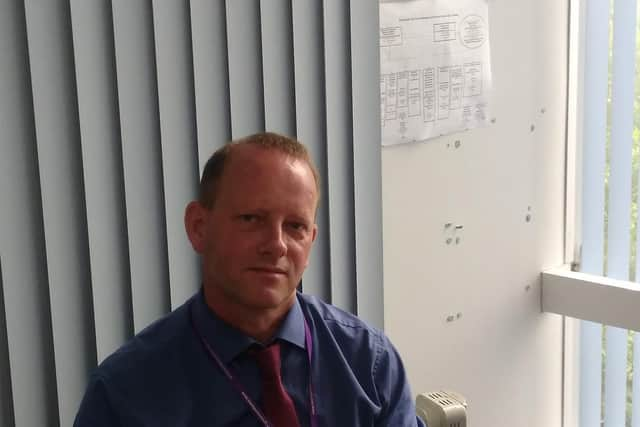Plan launched to avert '˜car crash' problem in Portsmouth with teacher recruitmentÂ


The common consensus amongst Portsmouth's educational leaders is that maintaining the provision of a high calibre teaching staff in the city's schools is a growing problem.Â
Deputy director for children's services, Mike Stoneman, said: '˜The information we are getting from headteachers, and I have seen it myself through my involvement in leadership roles, is we do have a big issue in the city. All schools are reporting recruitment issues, particularly in certain subjects such as maths, science and modern foreign languages.'
Advertisement
Hide AdAdvertisement
Hide AdIn terms of recruitment of new teachers there has been a regional 10 percent reduction in the number of trainees enrolling on teacher training courses with far higher figures in core subjects such as maths and English. Design and technology has be the worst affected with the number of course applicants having fallen by 67 percent.


Whilst Portsmouth is currently fairing better than the picture nationally Mr Stoneman believes the situation is being compounded by an increasing school population.
'˜Over the last five years our primary numbers have increased significantly and our secondary population is starting to grow as the '˜primary bulge' pushes through. We have the perfect storm developing with rising numbers of students and a situation where we need more teachers than ever before. Yet at the same time we have this growing issue of recruitment and retainment,' explained Mr Stoneman.
Teach Portsmouth Coordinator, Sophie Venables, who has been charged with the task of addressing the issue, also believes action needs to be taken now avoid future ramifications.
Advertisement
Hide AdAdvertisement
Hide Ad'˜If we don't do something different we are coming up for a '˜car crash'. There is a rising population hitting secondary schools which has a huge tail. With so many additional children combined with fewer graduates and increasing numbers leaving the profession we have a significant problem on the horizon here in Portsmouth,' explained Mrs Venables.


In terms of teacher retention a key area of focus is on the two extremes of the career spectrum '“ newly qualified teachers and experienced classroom practitioners. Figures released by the NASUWT show that 13 percent of newly qualified teachers leave within their first year and the number of teachers aged between 50 and 59 has decreased by 20 percent in the last six years. The issue of a diminishing pool of experienced teachers certainly seems to be prevalent in Portsmouth. Data taken from the School Workforce Census shows that the proportion of teachers in Portsmouth aged 50 and above is 16.4 percent which is 8.6 percent lower than in 2010.
Sarah Christopher, manager of the Portsmouth Education Partnership, said: '˜As someone of 50 who has just come out of teaching profession, faced with a rise in pension age, I found the thought of having to work in teaching for approaching the next 20 years quite a daunting prospect.'
'˜Increasingly expensive experienced teachers are leaving to be replaced by NQT's, particularly in secondary schools where the number of older teachers is very low,' added Mrs Venables.
HEADTEACHERS
Advertisement
Hide AdAdvertisement
Hide AdA particular area of concern for Portsmouth is the recruitment of headteachers.
'˜I am involved in recruitment and the appointment of headteachers is absolutely an issue. When schools put out applications for headships there have been occasions when we received no applications whatsoever. One school in the city put out adverts on four separate occasions before receiving any credible applicants,' explained Mr Stoneman.
'˜Taking on a headship role in an inner city area of Portsmouth is a very challenging job. With the rates of pay we are able to offer some candidates will prefer to apply to areas where the challenges may not be as great,' he added.
WHY THE GROWING PROBLEM IN PORTSMOUTH?
In 2011 teaching was the number one choice for graduates and seven years on it is not even in the top ten. Portsmouth very much reflects this national trend with a combination of years of real term salary cuts, constant curriculum change and increasing levels of suffocating accountability cited as key reasons for the professions decline in popularity.
Advertisement
Hide AdAdvertisement
Hide AdThe teaching unions believe overriding all these reasons is the issue of workload.
Vice President of the National Education Union, Amanda Martin, said: '˜For many years Portsmouth bucked the trend but we are now undoubtedly being affected by recruitment and retainment concerns. Every time we have surveyed members workload is always comes out top as the reason for teachers leaving the profession. Unless this issue is dealt with then you aren't going to solve the problem.'
Mike Stoneman believes the changing role of the teacher under the parameters of additional expectations is also at the forefront of the issue.
'˜Today teachers are being asked to move into a range of roles covering pastoral and social work. It is a very challenging role particularly in a city like Portsmouth,' explained Mr Stoneman.
THE SOLUTION
Advertisement
Hide AdAdvertisement
Hide AdA key area the Portsmouth Education Partnership are looking to address is raising the profile and perception of teaching as a career choice.
'˜Teaching has become the bridesmaids role of professionals. It is not perceived as being as valuable as other comparable careers,' explained Mrs Venables.
'˜We need to raise the profile of teaching in the city and celebrate some of the outstanding teachers we have. They need to be recognised,' added Mr Stoneman.
At the forefront of achieving this goal is '˜Teach Portsmouth Week' which will take place between the 1st and 5th of October.
Advertisement
Hide AdAdvertisement
Hide AdOrganiser Sophie Venables said: '˜The aim of the week is to celebrate teaching in the city because for too long I think teaching has become a bandwagon of negativity. The week will focus on promoting teaching with schools, governors, parents, children and teachers all involved.'
The pinnacle of the week will take place on Friday with an awards ceremony to recognise '˜teaching teams' nominated by schools.
Another key feature of the plan is the '˜Grow Your Own' initiative which aims to get students into schools and colleges to get a '˜feel for' the teaching profession.
'˜We have students from the university acting as mentors and providing support to pupils at Portsmouth College. Similarly we have students from the college carrying out the same role to support children in schools. Hopefully this can act as an inspiration to young people who may then consider teaching as a career option,' explained Mr Stoneman.
Advertisement
Hide AdAdvertisement
Hide AdMrs Venables also hopes the project will provide practical support with business subsidised bursaries and the provision of low cost housing to attract teachers to the city.Â
VIEW FROM THE CHALKFACEÂ
Having only left the classroom on a permanent basis in May I have witnessed the first-hand the ramifications of the current recruitment and retainment crisis for teachers, schools and most importantly children. The situation of a diminishing pool of teachers is compounded by budgetary constraints which means school leaders need to be creative in how they utilise their staff.
Whilst teaching timetables have always required some degree of flexibility at Key Stage 3 there is undoubtedly now a growing burden of expectation for teachers to fill '˜gaps on the timetable' by teaching GCSE and even A level in subjects outside their specialism. Data taken from a recent school workforce census indicates that only 65.1 per cent of geography, 72.4 per cent of history and 62.5 per cent of physics teachers hold a relevant post A-level qualification. For maths, the figure was 73.7 per cent of teachers and for English, 77.6 percent. Despite the best efforts of teachers this will inevitably have implications for student learning and attainment.
Whether through budgetary constraints or lack of applications there was certainly a growing trend in teachers who left their post not being replaced. Leadership roles were often '˜readjusted' and filtered out into the remit of other staff with teaching assistants being cajoled into taking on additional classroom responsibilities, often without increased remuneration.
Advertisement
Hide AdAdvertisement
Hide AdAll such measures will ultimately do is increase the workload and pressure on those remaining in the profession and exacerbate the key factors as to why people are leaving teaching in the first place.'‹'‹Â     Â
 Â
     Â
Â